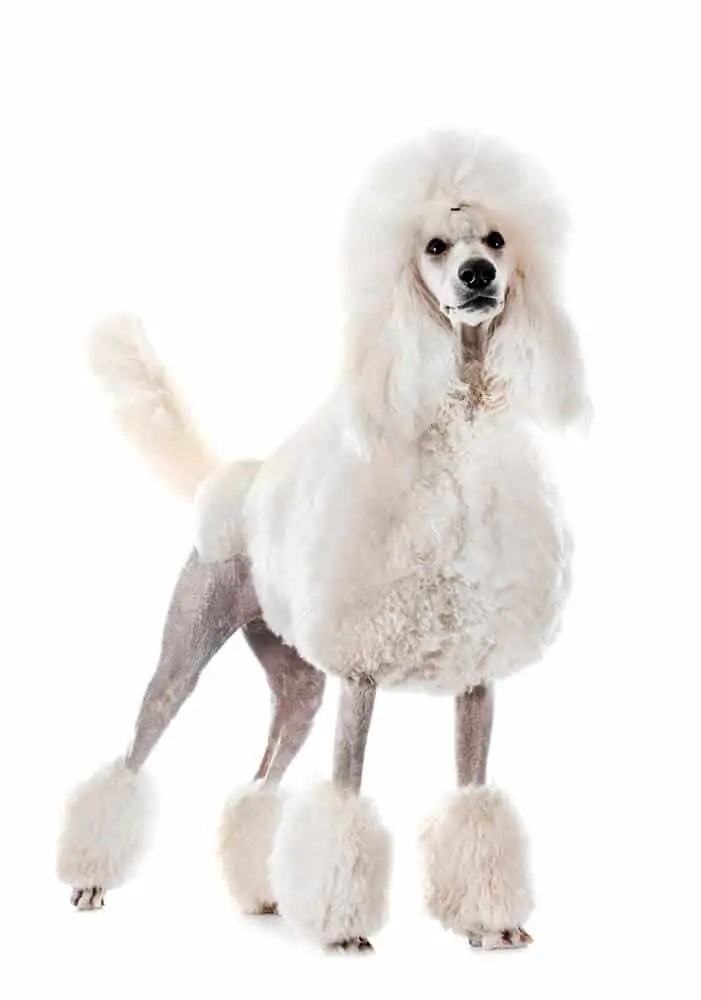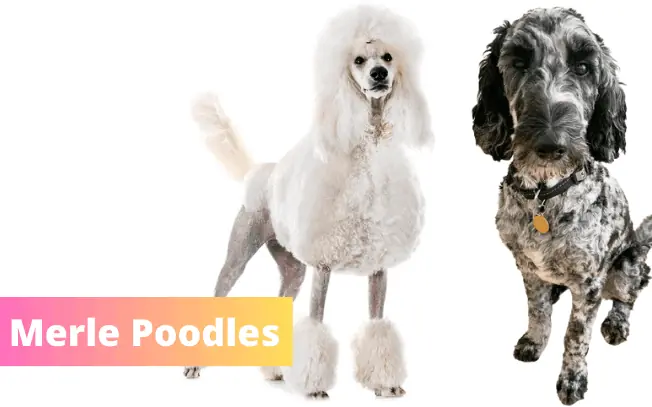Last Updated on
Merle Poodles are a beautiful and unique variation of the Poodle breed. Their beautiful coats, characterized by patches of different colors and patterns, have captured dog lovers’ hearts everywhere.
But despite their growing popularity, many people still don’t know much about Merle Poodles.
In this blog post, we’ll dive into what a Merle Poodle is, how they differ from purebred Poodles, and their temperament and personality.
We’ll also explore the differences between Merle, parti, and brindle Poodles and discuss some of the potential side effects of the Merle gene.
What’s a Merle Poodle?
A merle Poodle is a unique and distinct dog breed that stands out due to the cacophony of colors that adorn its coat. The Merle Poodle, like other types of Poodles, are highly intelligent and athletic, making them a popular choice for many dog owners.
Unlike the typical solid-colored Poodles, Merles are patterned with darker colors over a base color.
This results in various hues’ patches, dots, spots, and dashes.
Merle Poodles versus purebred Poodles

The main difference between Merle Poodles and Purebred Poodles is their coat pattern. Merle Poodles have a unique, mottled coat pattern in various colors, including white, red, black, and blue.
Note: a blue merle poodle isn’t actually “blue” but rather a blueish grey. See this picture of a blue merle Labradoodle.

This merle coat color pattern results from a genetic mutation that does not meet all Poodle breed standards, which is why many people don’t consider the Merle Poodle a purebred Poodle.
On the other hand, Purebred Poodles most commonly come in a range of solid colors, including black, white, brown, apricot, and red. They have a curly, low-shedding coat that requires regular grooming to prevent matting.
It’s important to note that while Merle Poodles are not recognized by all breed standards, some people still consider them to be Purebred Poodles.
Temperament and personality of Merle Poodles
Merle Poodles, like all dogs, can vary in temperament and personality. However, some general characteristics are commonly associated with this breed.
Energetic
Merle Poodles are generally known to be highly energetic dogs. They are active and playful and require regular exercise to maintain their physical and mental health.
Merles are happy on daily walks, jogs, or runs and enjoy participating in outdoor activities such as hiking, swimming, and fetching.
Their high energy levels make them great companions for families with children, as they can keep up with their energy and provide them with hours of entertainment.
However, it is important to remember that each dog is unique, and some Merle Poodles may have different energy levels than others.
Intelligent
Merle Poodles possess exceptional intelligence, making them popular among dog owners interested in a highly trainable and obedient companion.
The intelligence of this breed is not limited to just following commands but also extends their ability to think creatively and solve problems.
They are quick learners with excellent memory retention, making them easy to train in basic obedience and more advanced skills.
Their intelligence also flows into their social skills, as they are highly attuned to their owner’s emotions and can quickly adapt to new environments.
Affectionate
The Merle Poodle breed is well known for its affectionate nature. These dogs are highly social and enjoy human interaction, making them ideal pets for families and individuals.
They are loyal and committed to their owners, often seeking affection and attention.
This affection reaches beyond their owners, who are also friendly towards strangers and other animals. Their intelligence and easy-to-train nature make them highly adaptable to different living environments, ensuring they fit well with any household.
Moody
The Poodle is a sentimental breed admired for their empathetic nature and high emotional intelligence. These dogs are extremely intuitive and can pick up on their owners’ emotions, often responding with comforting and supportive behaviors.
Their intense feelings can make them prone to anxiety and stress, particularly when faced with loud noises or unfamiliar situations.
As such, owners of Merle Poodles need to provide them with a calm and stable environment and plenty of positive reinforcement and affection.
With the proper care and attention, these dogs can make loyal and loving companions for many years.
Dedicated
Merle Poodles are a highly dedicated breed that forms strong bonds with their owners. They are loyal, intelligent, and affectionate dogs that will go to great lengths to protect and care for their family.
This dedication may be traced back to their history as working dogs, where they were trained to be obedient and loyal to their handlers.
Sensitive
Regarding temperament, Merle Poodles can be quite sensitive and may become anxious or stressed if they are not given enough attention or exposed to loud or chaotic environments.
They may also be prone to separation anxiety if left alone for long periods of time.
What is a cryptic Merle Poodle?
A cryptic Merle Poodle is a type of Merle Poodle that carries the Merle gene but does not display the typical Merle coat pattern. This means that the Merle gene is present in the dog’s DNA, but it is not visibly expressed in the dog’s coat.
The Merle gene is responsible for creating a marbled or speckled pattern in a dog’s coat, and it is a dominant gene, meaning that only one copy of the gene is needed to express the merle pattern.
However, in some cases, a dog may carry the Merle gene but not display the pattern due to other genes or factors that suppress the expression of the Merle gene.
Cryptic Merle Poodles may have solid or parti-colcored coats, but they carry the Merle gene and can pass it on to their offspring.
It is important to note that breeding Merle Poodles together can increase the likelihood of producing offspring with health issues, such as hearing and vision problems, which is why responsible breeders take great care to avoid such breeding practices.
Side effects of the Merle gene in Poodles
When two Merle Poodles are bred together, the Merle gene can also be associated with various health problems in dogs.
Here are some of the known side effects of the double Merle gene in Poodles:
Hearing problems
The Merle gene is associated with a higher risk of congenital deafness, particularly in dogs with two Merle Poodles (known as “double Merles”).
Eye and vision problems
Double Merle Poodles can have various eye abnormalities such as microphthalmia, coloboma, and cataracts that can affect their vision.
Immune system disorders
Double Merle Poodles may have a weakened immune system, making them more prone to infections and other health issues.
Comparing the unique coat patterns of Merle vs. parti Poodles
Merle patches can vary in size and intensity, and they often have a fading or dilution effect that creates a unique, mottled appearance.
In contrast, the patches on parti Poodles have distinct borders and are usually solid in color.
Merle is a genetic pattern that creates a marbled effect of dark patches on a lighter base color. It is caused by an incomplete dominant gene that affects pigment distribution in the coat.
Merle Poodles typically have green, hazel, blue or partially blue eyes and may have patches of white or cream in their coats.
Some Merle Poodles also have what’s called a “phantom” pattern, which features solid patches of a darker color on their legs, tail, and face.
Parti poodles, on the other hand, have a two-color coat pattern that is usually white with another color, such as black, brown, or red.
Unlike Merle Poodles, parti Poodles have a more uniform color distribution, with distinct patches of solid color.
Some parti Poodles may have a third color as well, creating a tri-color pattern. Overall, both merle and parti Poodles are beautiful and unique in their own ways.
Comparing the coat patterns of Merle and brindle in Poodles
Brindle Poodles have a coat pattern characterized by dark, tiger-striped markings that intermingle with the base coat color, rather than distinct patches. The brindle pattern is caused by layered black hair that produces a distinctive stripe effect.
In contrast, the Merle pattern is characterized by dark patches that are usually a different color than the base coat, with the patches blending into each other to create a mottled or marbled appearance. The Merle pattern can also include white or light-colored patches in addition to the darker ones.
However, the brindle pattern is more uniform and consistent in its appearance than the Merle pattern.
While the stripes may vary in thickness or intensity, they generally cover the entire body and do not have the same marbled or patchy appearance as the merle pattern.
Do Merle Poodles fade or change color?
Yes. Merle Poodles can sometimes fade or change color as they grow older. This is because the Merle pattern is caused by a gene that affects the distribution and intensity of pigment in the coat. Over time, the expression of this gene can change, leading to variations in the appearance of the coat.
Merle Poodles can sometimes exhibit a “phantom” effect, where the darker patches of the merle coat gradually fade or become less distinct over time, resulting in a more muted appearance.
This can happen gradually throughout the dog’s life, or it may be more pronounced during certain stages of growth or development.
However, it’s important to note that any changes in the coat color or pattern should be closely monitored, as they can be a sign of underlying health problems.
Can merle Poodles be AKC-registered?
Merle Poodles cannot be registered with the American Kennel Club (AKC) because the AKC Poodle Breed Standard only recognizes solid-colored Poodles in various shades, including black, white, apricot, gray, and brown.
The AKC Poodle Breed Standard is a set of guidelines and criteria that all Poodles must meet to be considered purebred dogs and registered with the AKC.
Merle is not considered a recognized color in the AKC Poodle Breed Standard, which means that any Poodle with Merle coloring is not eligible for AKC registration.
Merle is a complex genetic trait that results in a mottled or spotted coat pattern, and it is not a naturally occurring trait in Poodles.
To produce Merle puppies, breeders introduce genes from another breed into the Poodle’s bloodline, typically through crossbreeding with a breed like the Australian Shepherd or Border Collie.
However, the AKC requires that purebred Poodles be produced by breeding dogs of the same breed, with no mixing of genes from other breeds.
Where to find a merle Poodle puppy
Reputable breeder
A reputable breeder will not claim a Merle Poodle to be purebred because the Merle coloration is not recognized by the American Kennel Club (AKC).
Despite this, there are people who breed Merle Poodles. You can recognize reputable breeders with these tips:
- Be wary of anyone who claims Merle Poodles are purebred. As we’ve learned, they aren’t.
- Look for Poodle breeders who are members of a recognized Poodle club or organization, such as the Poodle Club of America. These breeders are likely to follow ethical breeding practices and adhere to breed standards.
- Ask the breeder for references from previous customers or other breeders they have worked with. Reputable breeders will be happy to provide references and share their experiences with you.
- Research the breeder’s reputation and history. Look for reviews and feedback from other customers or people in the dog breeding community. You can also check with the AKC to see if the breeder has any disciplinary actions or complaints against them.
- Ask the breeder about their health testing protocols. Reputable breeders will conduct health tests on their breeding dogs to ensure they are free from genetic disorders and other health issues that can be passed on to their merle offspring.
- Ask to see the breeding facilities and meet the breeding dogs and puppies in person. A reputable breeder will welcome visits and be transparent about their breeding practices and the conditions in which their dogs are raised.
- Avoid breeders with large numbers of dogs or who are unwilling to answer your questions or provide information about their breeding practices. These may be signs that the breeder is running a puppy mill or is not operating ethically.
By following these tips, you can find a reputable breeder of Merle Poodles who prioritizes the health and well-being of their dogs and puppies and follows ethical merle breeding practices.
Adoption
Adoption is a wonderful way to bring a furry companion into your life while positively impacting the animal community. If you are specifically looking for a Merle Poodle, I highly encourage you to consider adoption agencies and animal shelters as your first option.
Not only will you be giving a loving home to an animal in need, but you will also be helping to support the important work that these organizations do on a daily basis.
Adoption agencies and animal shelters work tirelessly to care for and find homes for animals of all shapes and sizes. By adopting a Merle Poodle from one of these organizations, you will be directly supporting their mission.
When you adopt a Merle Poodle, you are not only getting a new companion, but you are also making a lifelong commitment to care for and love them.
It is important to remember that adopting a pet is a big responsibility, requiring time, patience, and dedication.
Conclusion
Consider your options and do your research before getting a Merle Poodle. They make great companions, but there are potential health risks associated with the Merle genes.
Choose a reputable breeder or adoption agency that prioritizes animal health. However, Finding the right Merle Poodle can lead to years of love and joy in your home.
This article may include affiliate links. www.travellingwithadog.com is a participant of Amazon.com Services LLC Associates Program. As an Amazon Associate, I earn a commission from qualifying purchase. www.travellingwithadog.com participates in other affiliate programs, and recieves commissions when purchases are made through the links. The cost is not inflated to account for the commission earned.
Veterinary Disclaimer: travellingwithadog.com is not a substitute for veterinary advice and does not intend to provide any type of veterinary advice for your animals. Please consult your vet for any questions you have regarding your pets health.

About the Author:
Dana owns a Sheepadoodle and a rescue merle Labradoodle. Her first dog growing up was a white Toy Poodle and she’s loved dogs ever since. She has years of experience fostering dogs and has helped find homes for a variety of different breeds, both large and small! After seeing so many dogs end up unwanted and in shelters, she began blogging about different dog breeds (specifically Doodle dogs, since that’s what she knows best) to help people make informed choices when adding a new member to their family.
When Dana’s not brushing her Doodles’ hair (it takes a lot of time for two!) you can find her playing nose work games and fetch with her two amazing pups.
Learn more about her here.

